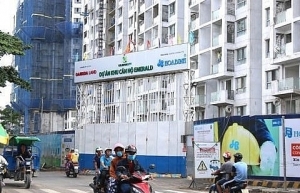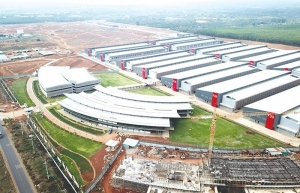Precise plans a must for investors’ land lease activity
Leasing a plot of land in an industrial zone (IZ) is the most common method to acquire land use rights in Vietnam for manufacturing. Most local authorities now require manufacturing activities to be conducted in IZs, economic zones, or export processing zones which have been zoned for manufacturing purposes.
Foreign investors should consider a couple of matters, among others, when leasing land from IZ developers.
First and foremost, businesses and foreign investors should thoroughly consider taking land leases with one-off or annual rental payments.
 |
| Richard Irwin - Partner, PwC Vietnam and Phan Thi Thuy Duong - Partner, PwC Legal Vietnam |
Under the Law on Land 2013, IZ developers can lease land from the state with either one-off or annual rental payments. In practice, most IZ developers choose to lease land in the form of annual rental payments.
For land leased from the state under a one-off rental payment, IZ developers can sublease this to tenants including foreign-invested enterprises in the form of one-off or annual rental payments. However, for land leased with annual rental payment to the state, IZ developers can only sublease land under annual rental payments.
Therefore, foreign investors need to consider the differences between these two forms of rental payment.
For land leased with a one-off rental payment, tenants are entitled to transfer the associated land use right, mortgage the land use rights (LUR) or contribute the rights as capital to another company. However, for land leased with annual rental payments, tenants have fewer rights and, for example, cannot transfer their LUR.
In practice, some IZ developers which lease land with annual rental payments typically allocate the rental fee into two parts, land rental fee and infrastructure fee. The infrastructure fee accounts for a large proportion and is usually paid once for the entire lease term. The land rental fee is determined according to the state land rental price, which is generally much lower than the infrastructure fee, and paid annually by the tenant.
From a legal perspective, the tenants in this case are treated as leasing land in the form of annual rental payment.
In light of the above, before deciding to lease land, investors should clarify the form of the IZ developers’ land lease, i.e., whether it is an annual or a one-off rental payment.
Secondly, foreign investors should notify about cooperation of the IZ developer when tenants exercise rights over their leased land.
By law, tenants are entitled to exercise certain rights such as transferring or subleasing the LUR and/or assets attached thereto, depending on the form of the land lease. However, land sublease agreements often provide that in order to exercise such rights, the tenants must seek advance approval and support from the IZ developer before performing such transactions. In some cases, the tenants must also pay a fee as requested by the IZ developer.
Therefore, during the negotiation of land lease agreements, to avoid potential subsequent problems, investors should ensure that there are appropriate terms which require the support and cooperation of IZ developer in this regard.
Overall, there are a few significant points to consider regarding MoU for land leases and deposits.
To build factories in accordance with the technical requirements of the tenants, the leased land must meet certain conditions. Therefore, investors should carefully research and agree in advance with the IZ developer on such technical requirements – for example, construction planning, construction density, and foundation elevation before construction – so they can properly estimate the costs before signing any MoU and paying deposits.
Investors should also agree and clarify with the IZ developer regarding wastewater treatment systems, allowable treatment capacities, as well as who bears which costs if in future there is a need to increase treatment capacities. This can help to avoid the case where wastewater treatment systems do not cope with the production scales or cannot be expanded.
The above are just some of the issues related to land leases which investors should consider, and there are various other matters which investors should consider before deciding to sign agreements and place deposits for land.
 | More sectors to be eligible for tax, land lease payment extension The Ministry of Finance has suggested adding four sectors into the list of industries eligible for extension of tax and land lease payment deadlines with a total sum of 180 trillion VND (7.82 billion USD). |
 | Government orders probe into HCM City waiver of fee for land lease to foreign firm Deputy Prime Minister Truong Hoa Binh has ordered an inspection into HCM City authorities’ leasing of 82.5ha of land to Malaysian property developer Gamuda Land Joint Stock Company without collecting land-use fees. |
 | Improved business environment is the key to FDI not tax and land incentives ASEAN countries need to choose between recovery based on wasteful competition for investment or coordination, cooperation, and joint hands to generate sustainable tax revenue to spend on health, education, and other public goods that are essential to fight poverty and inequality. |
 | Prolific advances in industrial zones Funding into industrial zones is expected to be fruitful for the majority of the year, when the demand for land lease recovers and a range of contracts are completed. |
What the stars mean:
★ Poor ★ ★ Promising ★★★ Good ★★★★ Very good ★★★★★ Exceptional
Related Contents
Latest News
More News
- IP alterations shape asset strategies for local investors (January 22, 2026 | 10:00)
- 14th National Party Congress: Vietnam - positive factor for peace, sustainable development (January 22, 2026 | 09:46)
- Japanese legislator confident in CPV's role in advancing Vietnam’s growth (January 22, 2026 | 09:30)
- 14th National Party Congress: France-based scholar singles out institutional reform as key breakthrough (January 21, 2026 | 09:59)
- 14th National Party Congress: Promoting OV's role in driving sustainable development (January 20, 2026 | 09:31)
- 14th National Party Congress affirms Party’s leadership role, Vietnam’s right to self-determined development (January 20, 2026 | 09:27)
- Direction ahead for low-carbon development finance in Vietnam (January 14, 2026 | 09:58)
- Vietnam opens arms wide to talent with high-tech nous (December 23, 2025 | 09:00)
- Why global standards matter in digital world (December 18, 2025 | 15:42)
- Opportunities reshaped by disciplined capital aspects (December 08, 2025 | 10:05)

 Tag:
Tag:




















 Mobile Version
Mobile Version